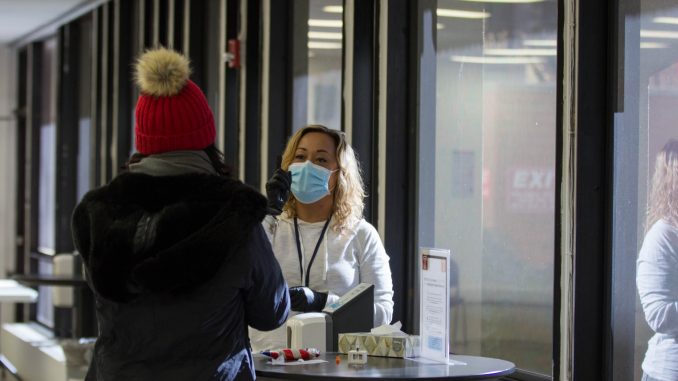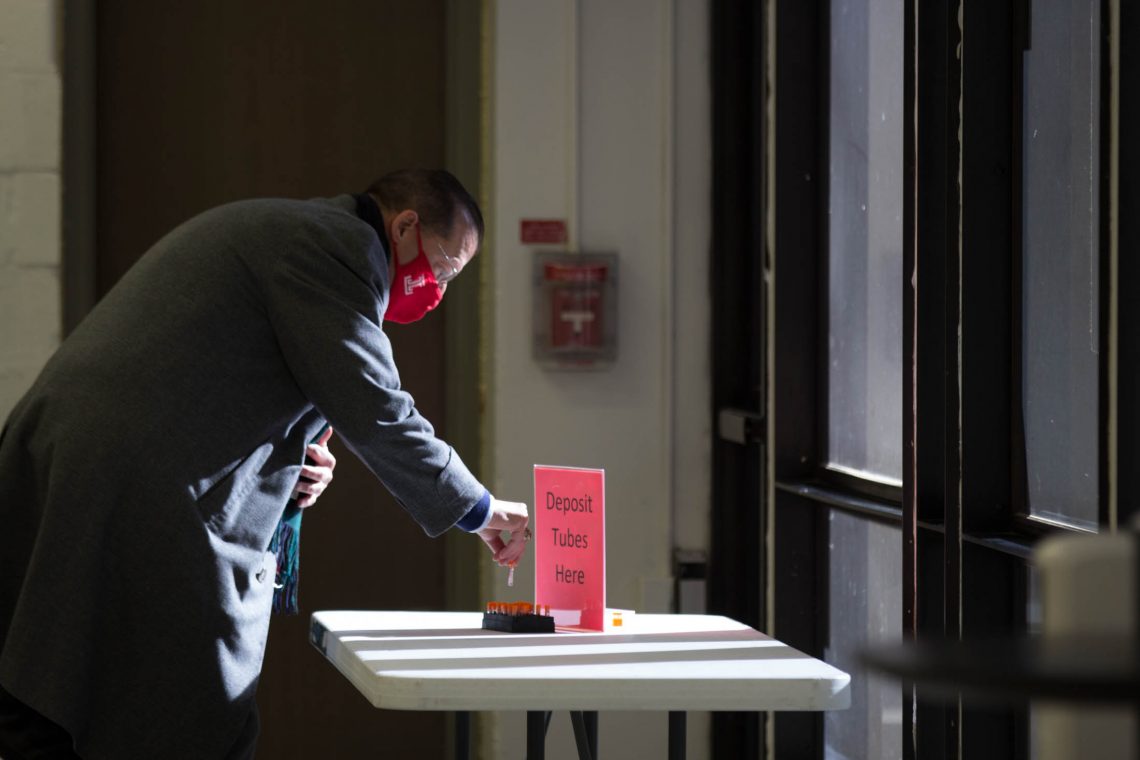
Temple University’s new $10 million COVID-19 testing plan, which began during the first week of classes, includes mandatory regular testing for students with in-person classes and voluntary testing for employees.
Employees who interact in person on campus more than one day per week can get tested twice per week, while other employees who do not interact in person on campus can get tested once per week, according to a university announcement from Jan. 19.
The university asked employees who are not regularly on campus to refrain from getting tested at Main Campus sites to decrease the number of people on campus, but Temple will test any employee who comes to campus for now, said Mark Denys, director of Student Health Services.
“If we start reaching our capacity, then we’d have to start looking at it more closely and possibly limit folks,” Denys added.
As part of the new testing program, the university will give mandatory tests to students with in-person classes or a job on campus at least once per week, The Temple News reported.
Temple will require testing of 4,000 students twice per week and 1,200 students once per week, but those numbers could fluctuate, The Temple News reported.
As of Feb. 1, Temple recorded 109 positive COVID-19 cases on campus, with 105 among students and four among employees, including five cases in on campus housing, according to the dashboard.
“We haven’t identified any overarching clusters or issues with the positive cases, they’ve really been spread out,” Denys said. “I think it’s a combination of a lot of people coming back to campus at the same time, there are just a lot of moving parts.”
Mike Hughes, a marketing and supply chain management professor who teaches in person, will get tested every Friday for “peace of mind,” he said.
“If it’s available, it’s the right thing to do,” Hughes said. “I take it seriously. I want to be safe to me, my family and my students.”

The Temple Association of University Professionals is reviewing whether its members have accessed the testing as the plan outlined, wrote Steve Newman, an English professor and TAUP’s president, in an email to The Temple News.
“We haven’t had reports that they haven’t received this testing, but until we hear from a fair number of them, we won’t have a trustworthy picture,” Newman wrote.
In September 2020, 80 percent of TAUP members voted to hold classes online through Spring 2021, The Temple News reported.
Even with the new testing program, Temple should not offer in-person classes that it doesn’t need to, Newman said.
“Don’t get us wrong, we understand our members would much rather be teaching in person, all things considered, but running a dance class during a respiratory virus in person strikes us as very wrongheaded and dangerous,” Newman said.
The university will not notify professors if a student tests positive for COVID-19 in their in-person classes unless they are a close contact, which Temple defines as standing closer than six feet to someone with COVID-19 for longer than 15 minutes, Denys said.
But with the four pillars of public health and de-densified classrooms, professors should not be in close contact with students, Denys said.
“Due to confidentiality of the positive student, we honor that and we don’t expose positive students,” he said. “Even when we’re talking to close contacts, we don’t give the name of the student.”
TAUP believes the university should notify faculty when someone in their workspace tests positive because Temple is assuming that COVID-19 will never travel more than six feet and that students and staff will always follow safety protocols, Newman said.
“Our view is that the professionals who we represent should be informed,” Newman said.
Temple tried to guide employees to the Paley Hall testing site, where 250 COVID-19 tests were given during the first week of testing, but employees also got tested at other Temple sites, Denys added.
The university can process up to 26,000 COVID-19 tests per week among students and employees, and administered 10,239 total tests during the first week of testing, according to the university’s COVID-19 case dashboard.
Of the 10,239 tests, 9,227 were for asymptomatic individuals, Denys said. Overall, the testing process ran smoothly with only a few hiccups, he added.
Temple could not salvage roughly 100 testing vials because of errors, including vials returning to the lab with no liquid or no nasal swab, barcodes becoming unreadable and nasal swabs jamming the lab’s testing robot, Denys said.
Denys would like to shorten the turnaround time for the COVID-19 test results to less than 24 hours. During the first week of testing, Temple returned about 60 percent of test results within 24 hours of the lab receiving the test, Denys said. The rest of the tests were returned within 36 hours.
The university hired 36 full-time employees for the new testing program, as well as a number of student workers, Denys said.
Monica Ricketts, a history professor who is not teaching in-person classes, got her first COVID-19 test on Friday.
“I feel much safer, especially working in my office, using the facilities and going to the library, and I think it should be everywhere like this,” Ricketts said. “Testing should be very accessible.”


Be the first to comment